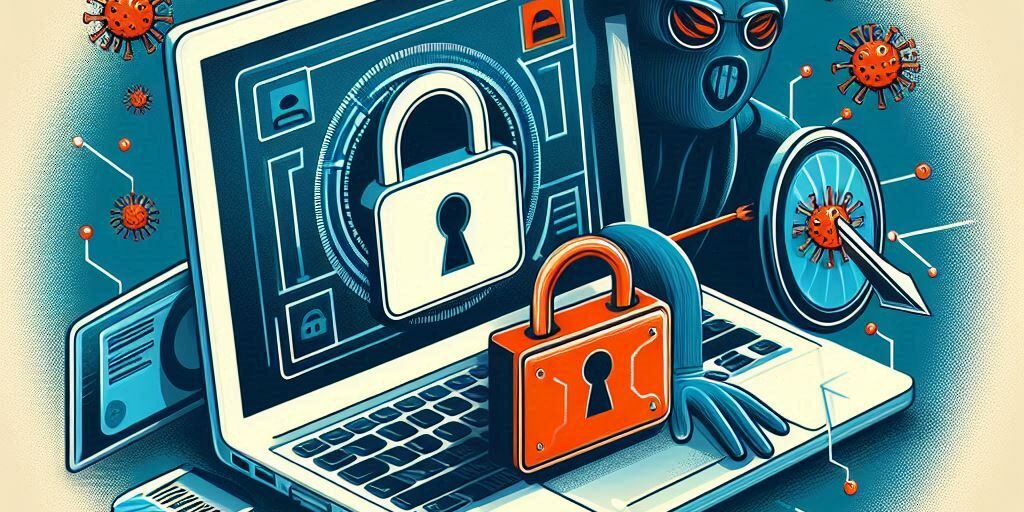Laptop virus protection for banking is more critical than ever in today’s digital age. Your laptop stores sensitive financial data, making it a prime target for malware and viruses.In today’s interconnected world, your laptop is more than just a tool—it holds sensitive information such as bank credentials, personal data, and passwords. A virus infection on your laptop can lead to significant security risks, including bank fraud. Taking swift and effective action is essential to safeguard your finances.
Table of Contents
ToggleThis guide outlines immediate actions to take after a virus attack, long-term measures for preventing future breaches, and the importance of securing your bank accounts.
How Laptop Viruses Can Lead to Bank Fraud
1. Methods of Virus Infection
Viruses infiltrate laptops through phishing emails, malicious websites, or unsafe downloads. These threats exploit vulnerabilities, often operating undetected.
2. Consequences of Malware on Financial Data
Once inside, malware can steal sensitive data like banking credentials. These threats can compromise your finances and personal identity.
3. The Role of Keyloggers and Fake Websites
Keyloggers record your keystrokes, capturing passwords, while fake websites mimic legitimate banking portals to trick you into providing login details.
What to Do Immediately After a Virus Compromises Your Laptop
1: Disconnect from the Internet
Cut off the virus’s access to external servers by disconnecting your Wi-Fi or Ethernet connection. This prevents further data transmission.
2: Log Out of All Devices
Log out from online banking and other sensitive accounts on all devices to stop unauthorised access.
3: Clear Saved Credentials
Delete stored passwords and autofill data in your browser and applications to prevent the virus from stealing your credentials.
4: Use Antivirus Software to Scan for Malware
Run a complete antivirus scan to identify and remove malware. Ensure your antivirus software is up-to-date.
Best Practices for Securing Your Bank Account
1: Change Your Bank Login Credentials
Create strong passwords using a mix of letters, numbers, and symbols. Avoid easily guessable information.
2: Set Up Two-Factor Authentication (2FA)
Enable 2FA for additional security, requiring a second verification step, such as a code sent to your phone.
3: Monitor Your Bank Account Regularly
Check for unauthorised transactions or unusual activity. Set up real-time alerts with your bank to catch suspicious activity early.
How to Safeguard Your Laptop from Future Attacks
1: Install Antivirus Software
Ensure your device is equipped with reliable antivirus software. Keep it updated to detect emerging threats.
2: Keep Your Operating System and Apps Updated
Enable automatic updates to close security gaps in your software.
3: Install a Firewall
Activate a firewall to block malicious traffic. Consider third-party options for enhanced protection.
Setting Up Additional Layers of Security
1: Use a Virtual Private Network (VPN)
A VPN encrypts your internet connection, making it harder for hackers to intercept your data, especially on public Wi-Fi.
2: Secure Your Wi-Fi Network
Protect your home network with a strong password and WPA3 encryption. Change the router’s default credentials for added security.
3: Avoid Using Public Wi-Fi for Banking
Never access banking sites on public Wi-Fi. If necessary, use a VPN for a secure connection.
Proactive Steps to Minimise Future Risks
1: Be Cautious with Phishing Emails
Avoid clicking on links or downloading attachments from unknown sources. Verify suspicious emails by contacting the sender through official channels.
2: Back Up Your Important Data
Store copies of essential files on cloud services or external drives to mitigate data loss during an attack.
3: Educate Yourself on Cybersecurity
Stay informed about the latest threats and security practices to identify and avoid risks.
When to Contact a Professional for Help
1. When Professional Assistance Is Necessary
If you cannot fully secure your laptop or suspect ongoing threats, seek help from cybersecurity experts.
2. Benefits of Contacting Cybersecurity Experts
Experts can thoroughly clean your device, secure your accounts, and provide advanced protection strategies.
Conclusion and Call to Action
A virus attack on your laptop is a serious threat to your financial security. By following the outlined steps, you can protect your accounts and prevent further fraud.
If you’re unsure how to proceed or need professional assistance, Perth Computer Experts can help. Contact us today for malware removal, device security, and expert advice on safeguarding your financial future.




